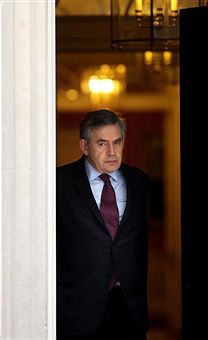 He did it. We saw him. It actually happened. History was made at PMQs today as Gordon Brown finally gave a direct answer to a direct question. Not only that, he admitted he’d been wrong about something. Tony Baldry (Con, Banbury) informed the PM that his assertion before the Chilcot Inquiry that defence spending has risen, in real terms, every year has been contradicted by figures released to the Commons library. Up got Brown, looking like a wounded old teddy-bear, and offered this epoch-making concession. ‘I accept that in one or two years real terms spending did not rise.’
He did it. We saw him. It actually happened. History was made at PMQs today as Gordon Brown finally gave a direct answer to a direct question. Not only that, he admitted he’d been wrong about something. Tony Baldry (Con, Banbury) informed the PM that his assertion before the Chilcot Inquiry that defence spending has risen, in real terms, every year has been contradicted by figures released to the Commons library. Up got Brown, looking like a wounded old teddy-bear, and offered this epoch-making concession. ‘I accept that in one or two years real terms spending did not rise.’
What a union of opposites. Brown and the truth. It was alarming, almost unnatural, to witness. Like Santa in a scuba suit or the Pope playing pinball. When Cameron got up he knew he was on to a good thing. He asked Brown to urge BA’s employees to cross the picket line during the upcoming industrial action. Brown attempted the ‘lofty statesman’ ploy and accused Cameron of wanting to prolong the strike not to resolve it. He then pulled out an antique newspaper article about the Tory leader’s readiness to chat with the unions.
Brown’s hope here was to embarrass Cameron by smothering him in a wave of ironic jeers from the Labour benches. But the Tory leader swatted him away with one of his deft improvisations. ‘It’s one thing to talk to the unions, another to give in to them.’ And when the Speaker asked Labour members to shout more quietly Cameron took another pop at the unions. ‘Most of them are paid to shout. That’s the point.’
Nick Clegg offered us a taste of how a coalition might work in practice. Instead of asking the PM a question he made a speech painting himself as the heroic pioneer of parliamentary reform and accusing the other parties of messing up his plans. Brown replied by copying Clegg. He claimed that he and Clegg had agreed on the perfect model for reform only to see it vandalised at the last minute by the Tories. Clegg disagreed. ‘He’s re-writing history.’ He repeated his version of events, insisting that he was the saint everyone else was the saboteur. If Cameron had had a question remaining he might have done the same. This may be what a hung parliament will mean: instead of two power-mad windbags claiming the moral high ground we’ll get three.
The best of the backbench questions came from Gerald Howarth who wanted to know why Charlie Whelan – who was implicated in the smeargate emails – still had access to Number 10. ‘Has the prime minister’s’ moral compass suffered the same fate as the mobile phones that got beaten up in the bunker?’
Brown flannelled some vague and ineffective reply to that. He was completely off his game today. Even the tactic he loves, (and which all commentators hate), had deserted him. Faced with a tricky question he likes to shift the subject to a dividing-line issue and then hose everyone into semi-consiousness with a list of statistics that prove his virtue and the opposition’s worthlessness. That was beyond him. His closing dig at Cameron – ‘he talks without notes because he has nothing to say’ – merely draws attention to one of Cameron’s strengths rather than exposing a weakness. And he kept fluffing his lines. He spoke about the strike as if BA were a natural disaster. ‘My thoughts are with the customers and those who depend for their jobs on the airline.’ He even misnamed his favourite tax-break and called the winter fuel allowance ‘the winter pensioner allowance’ three times. A shadow of fatigue and failure loured over him.
By contrast Cameron was relaxed, incisive and self-confident. The BA issue helped him to an easy victory. The strike is throttling Labour’s plan to fight a necromancer’s election and to set the debate entirely in the past. The Tory ghosts of sleaze, unemployment and high interest rates aren’t nearly as scary as the spectre of industrial inaction under Labour. While BA is grounded, the Tories can achieve lift-off. Cameron’s only gaffe today was his failure to pretend that he wants the dispute resolved.
 Lloyd Evans
Lloyd Evans
Miracle at SW1






Comments